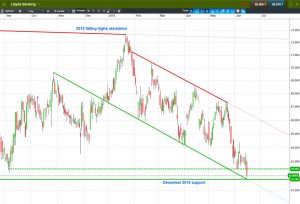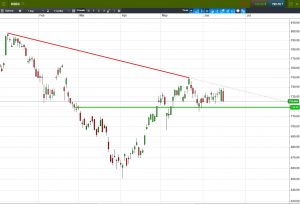This report is not a personal recommendation and does not take into account your personal circumstances or appetite for risk.
 The Big Four UK banks have been feeling the pain in 2018 as the combination of political turmoil, US/Eurozone interest rate spread and negative momentum has pushed their share prices lower. But not all big banks are the same and to make successful investments during the downturn, you need to take a closer look at the banks’ recent share price performance.
The Big Four UK banks have been feeling the pain in 2018 as the combination of political turmoil, US/Eurozone interest rate spread and negative momentum has pushed their share prices lower. But not all big banks are the same and to make successful investments during the downturn, you need to take a closer look at the banks’ recent share price performance.
Lloyds Banking shares have been on a general 2018 downtrend, in a falling channel going back to at least the beginning of the year. And here’s the real kick in the guts; the shares have broken below September 2017 support a 62.505p. Could things get any worse? Of course, they could, now that 61.7p December 2017 lows loom large right in front of investors blood-shot eyes. Not a pretty picture.
 Barclays doesn’t look much better, with a similar bearish breakdown below long-term support, with potential to revisit November lows. And RBS… well, we don’t talk about RBS around here, not with the government selling off its 62.4% stake in the lender, keeping the share price under pressure.
Barclays doesn’t look much better, with a similar bearish breakdown below long-term support, with potential to revisit November lows. And RBS… well, we don’t talk about RBS around here, not with the government selling off its 62.4% stake in the lender, keeping the share price under pressure.
Where is all this misery coming from? The reasons are multiple and sometimes unique to each stock, but the overall gloomy picture is painted with the brushes of Brexit uncertainty (given the banks’ exposure to Europe), geopolitical turmoil (in Europe and around the world) as well as key interest rates. With the US Fed raising interest rates, while the European Central Bank keeps rates unchanged, banks are still lacking the pre-crisis higher interest rates that would make them more profitable.
Is there any light at the end of the tunnel for market investors interested in bank shares? Curiously, HSBC’s share price charts look markedly different to peers Lloyds, RBS and Barclays. Yes, there’s that same falling highs resistance and the same kind of vulnerability to Brexit and interest rate spread. But what stands HSBC apart from its counterparts is its strong Asian exposure, and the bank’s geographic coverage offering protection that other, more locally focused banks, simply lack.
 So, is the lesson here to simply ditch Lloyds, and get into HSBC? First, we don’t offer advice to buy or sell stocks. Secondly, a savvy investor can benefit from almost any trend on the stock market, positive or negative, long or short term.
So, is the lesson here to simply ditch Lloyds, and get into HSBC? First, we don’t offer advice to buy or sell stocks. Secondly, a savvy investor can benefit from almost any trend on the stock market, positive or negative, long or short term.
Perhaps the simplest option is to simply ditch the banks altogether. There is also an opportunity to stop being afraid of stocks breaking below support and instead embrace the trend (as they say, “the trend is your friend”) and sell the banks short when that support is finally breached. Or investors can look for alternative investment opportunities (like HSBC as I mentioned before) that have slightly different profile from the rest of the pack.
Choosing the right way forward on the stock market is a very personal question that depends on investors’ risk profile and level of exposure.
Every day, we closely work with clients from all walks of life, helping them navigate the complexities of the stock market by helping them understand complex market moves and guiding them in executing trades.
Whether the shares go up or down, tradable opportunities arise all day every day. If you are interested in taking advantage of some of these opportunities, get in touch with me and join our community of investors by signing up for our Research and Trade ideas.
David Paradis, Trader at Accendo Markets, 15 June 2018
This research is produced by Accendo Markets Limited. Research produced and disseminated by Accendo Markets is classified as non-independent research, and is therefore a marketing communication. This investment research has not been prepared in accordance with legal requirements designed to promote its independence and it is not subject to the prohibition on dealing ahead of the dissemination of investment research. This research does not constitute a personal recommendation or offer to enter into a transaction or an investment, and is produced and distributed for information purposes only.
Accendo Markets considers opinions and information contained within the research to be valid when published, and gives no warranty as to the investments referred to in this material. The income from the investments referred to may go down as well as up, and investors may realise losses on investments. The past performance of a particular investment is not necessarily a guide to its future performance. Prepared by Michael van Dulken, Head of Research
Comments are closed.
Accendo Markets is an award-winning provider of CFD and spread betting trading services. We provide an execution-only service.
Telephone calls and online chat conversations may be monitored and recorded for regulatory and training purposes.
* We provide these as underlying assets to CFDs and Spreadbets.
To view our policies and terms, please click here
This website is not intended for or directed at residents of the United States or any country outside the UK. It is not intended for use by or distribution to any person in any jurisdiction or country where its use or distribution would contravene any regulation or local law.
Prices on this page are delayed.
Like many websites, we use cookies for statistical purposes and to acquire information on general internet use. This helps ensure that you get the full benefit of our services, and enhances your browsing experience . For more details on the cookies we use, view our privacy policy under the heading 'How We Use Cookies'. By using this website, we'll assume that you're happy to receive all cookies from Accendo Markets.
Removing cookies may impede the operation of some parts of this website. For general information about cookies and how to remove them, please click here
